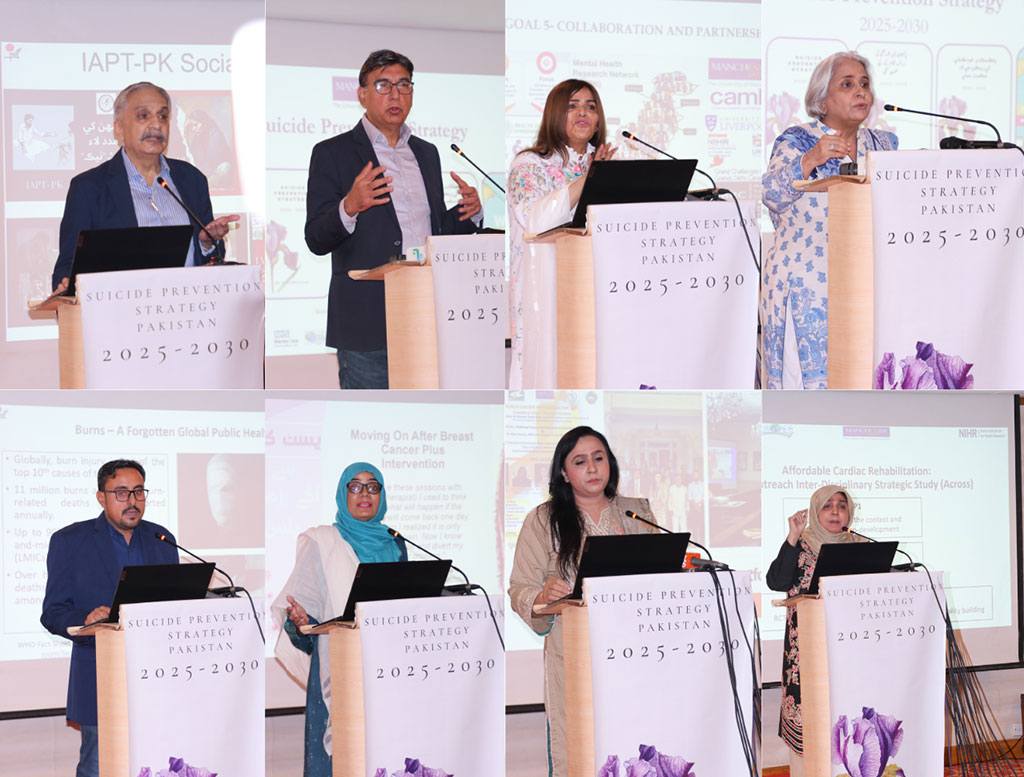NEWS DESK
KARACHI: The Pakistan Institute of Living and Learning (PILL), National Centre for Research on Suicide Prevention, Health Department Government of Sindh, and the University of Manchester proudly hosted the Suicide Prevention Strategy Launch at the Karachi Marriott Hotel. Sindh Health Minister Dr. Azra Fazal Pechuho was the guest of honour, alongside other key stakeholders including clinicians, research scientists, healthcare professionals, service users, community leaders, and members of the Sindh Health Department.
The event, commemorating both World Suicide Prevention Day and World Mental Health Day, addressed the increasing public health challenge of suicide, which affects individuals across all ages, genders, and backgrounds. The launch of this strategy marked a pivotal step toward a more unified and robust response to suicide prevention, particularly in Sindh.
Prof. Imran Bashir Chaudhry, Professor & Chairman of the Department of Psychiatry at Ziauddin Hospital, opened the event. “I am particularly pleased to welcome our esteemed Health Minister, Dr. Azra Fazal Pechuho, whose passion for improving access to psychological therapies has been a driving force behind the development of this initiative. Her vision for evidence-based mental health services is commendable, and our team has already visited key sites and engaged with stakeholders, alongside the PPHI team, to implement these initiatives,” he said.
Prof. Nasim Chaudhry, CEO PILL, extended heartfelt gratitude to the Health Minister on behalf of all individuals living with mental health challenges in Pakistan. “Suicide is the fourth leading cause of death among Pakistan’s predominantly young population. With seven goals outlined in the strategy, we are poised to make a significant impact.”
This strategy is the culmination of years of dedicated work on suicide prevention including the MRC/DFID/NIHR-funded world’s largest therapist-delivered trial aimed at reducing self-harm and suicide in adults (CMAP, MR/N006062/1) and youth (YCMAP, MR/R022461/1). This work builds on the SAHAR-M project, which explored self-harm and suicidal ideation across Pakistan, including Gilgit-Baltistan and Azad Kashmir. The SAHAR-M initiative has, over the years, developed partnerships and collaborations between organisations, institutes, academia, and the government. The strategy includes guidelines and interventions developed during NIHR funded ongoing research projects for burn survivors (NIHR203082), breast cancer (NIHR205561) and heart diseases (NIHR205540).
Sindh Health Minister Dr. Azra Fazal Pechuho delivered a strong address, focusing on importance of mental health and the current mental health landscape. “While health facilities in Sindh have been advancing, we still face shortage of psychiatrists but now we are including psychologists across the province address the treatment gap and use telehealth.
Our communities need to act as agents of change, raising awareness through media and other platforms. Survivors of chronic illnesses including burn Injuries, breast cancer and heart diseases with comorbid mental health conditions need rehabilitation, and we must ensure that this care is integrated into tertiary hospitals. Moreover, gender violence, especially among women, and the growing issue of drug abuse among children are areas we must urgently address.” She acknowledged the ongoing efforts of PILL and NCRSP in uncovering the root causes of suicide and self-harm and commended their dedication to addressing these critical issues.
Suicide remains a deeply complex issue, driven by a range of risk and protective factors and has far-reaching effects – not only for the individuals who take their own lives but also for their families, loved ones, and communities. This 2025-2030 initiative is designed not only to reduce suicide rates but also to promote a culture of hope and resilience. Pakistan requires a broader, population-based approach to addressing suicide, one that prioritises both mental health treatment and the strengthening of community partnerships.
Dr. Aneela Maqsood, Associate Professor at Fatima Jinnah Women University, expressed her pride in representing the NCRSP. “The centre represents PILL’s unwavering commitment in collaboration with University of Manchester to be a centre of excellence and positioning itself as a global research unit. This launch is a testament to the efforts of the PILL team, with two decades of research informing today’s work.”
There is no health without mental health. Multimorbidity is a major cause of disability and premature mortality. The Burn Rehabilitation (NIHR203082) Programme was highlighted by Mr. Ameer Bux, Assistant Director of Research Development and Dissemination, and Dr. Tayyeba Kiran, Assistant Director of Research and Development, presented on the Integrated Care Plan for Depressed Breast Cancer Survivors (NIHR205561) in Pakistan. Prof. Zainab Zadeh, Professorial Scientist and Head of Division of Child and Adolescent Health at PILL, spoke about the Cardiac Rehabilitation (NIHR205540) (ACROSS) initiative.
The event concluded with Prof. Nusrat Husain, Professor of Psychiatry, Director of Global Mental Health Research at the University of Manchester, extending his gratitude to the Health Minister and reflecting on Pakistan’s contributions to global mental health. “I have had the privilege of working in many countries, and I can confidently say that Pakistan has made an impact in both low- and high-income countries. Our work is being published in high-impact journals, replicated in Nigeria, Sri Lanka, and beyond. Few countries are tackling health economics and mental health care as effectively as Pakistan. With plans to implement the IAPT PK program in Sukkur and Qambar Shahdadkot, the world is looking to us for solutions. The work being done here is making an impact globally, and I am immensely proud to be part of this journey.”











